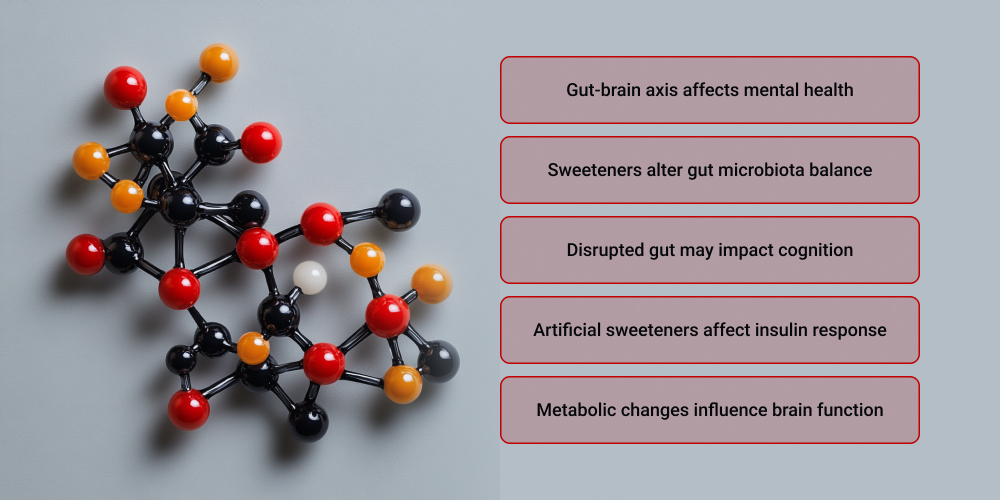Artificial sweeteners have become a common part of many people’s diets. From diet sodas to sugar-free snacks, these substitutes promise the sweetness we love without the calories of sugar. They’re everywhere, used by millions who want to cut sugar intake, manage weight, or control conditions like diabetes. But as their use grows, so do questions about how they might affect our bodies, especially our brains.
There’s a rising concern about whether these sweeteners could influence brain function and overall neurological health. Some wonder if swapping sugar for these alternatives comes with hidden costs. Could they change how we think, feel, or even process information? These are big questions. And they matter because our brains are central to everything we do – from solving problems to managing emotions.
With more people relying on artificial sweeteners every day, it’s worth taking a closer look at what science says about their effects. Let’s dive into how these sweeteners might impact our minds and bodies. We will explore everything from mental sharpness to mood swings. By the end, you’ll have a clearer picture of what’s at stake and how to make smart choices for your health.
What Are Artificial Sweeteners and How Do They Affect the Brain?
Artificial sweeteners are man-made chemicals. They are designed to mimic the taste of sugar without adding calories. Some popular ones include aspartame, sucralose, saccharin, and stevia (though stevia is often considered more natural). They’re found in countless products. They’re in diet drinks, chewing gum, and even toothpaste. People love them because they offer a guilt-free way to enjoy sweet flavors. This makes them a go-to for anyone watching their sugar intake.
But here’s where things get interesting. These sweeteners don’t just trick your taste buds. They interact with your brain too. When you taste something sweet, receptors on your tongue send signals to your brain. It lights up areas tied to pleasure and reward. Artificial sweeteners do the same thing, even though they’re not sugar. This can create a confusing message for your brain. It might expect calories that never arrive. Over time, this could lead to changes in how your brain responds to sweetness.
These interactions raise questions about cognitive effects. Some studies suggest that artificial sweeteners might influence:
- Memory
- Focus
- Decision-making
Because they alter the brain’s reward system, they could subtly affect neurological health too. They’re generally considered safe in moderation. However, the long-term impact on brain function is still being explored. Let’s break this down further to see what science has uncovered so far.
Cognitive Effects of Artificial Sweeteners: What You Need to Know
When we talk about cognitive effects, we mean how artificial sweeteners might shape things like memory, attention, and learning. Your brain relies on a steady flow of energy and clear signals to work at its best. But could these sugar substitutes interfere with that process? Some researchers think it’s possible.
For instance, a few animal studies have shown that high doses of artificial sweeteners like aspartame might affect memory. Rats fed these sweeteners sometimes performed worse on maze tests, hinting at a dip in mental sharpness. In humans, the evidence is less clear. However, some small studies suggest a link between h eavy sweetener use and trouble focusing or recalling details. It’s not a dramatic decline, but it might mean a slight mental fog over time.
eavy sweetener use and trouble focusing or recalling details. It’s not a dramatic decline, but it might mean a slight mental fog over time.
Why do these cognitive effects happen? One theory is that artificial sweeteners could disrupt the brain and its chemical balance. They might interfere with neurotransmitters, the messengers that keep your brain humming. While most people won’t notice a difference day-to-day, those who consume a lot of these sweeteners might want to pay attention. The takeaway? Moderation might be key if you’re worried about keeping your mind sharp.
The Role of Artificial Sweeteners in Mood Regulation and Mental Well-being
Beyond thinking skills, artificial sweeteners might also play a role in mood regulation. Ever feel cranky or anxious for no clear reason? Some wonder if what we eat – or sip – could be part of the puzzle. There’s growing interest in whether these sweeteners could affect emotions like anxiety, depression, or irritability.
Research here is still early, but there are clues. For instance, some studies tie aspartame to headaches or mood swings in sensitive people. Others suggest that sweeteners might mess with serotonin. It is a brain chemical that helps keep us calm and happy. If your brain’s mood system loses its balance, you might feel off without knowing why. There’s also a theory that the lack of real calories tricks the brain into craving more, leaving you restless or unsettled.
Not everyone agrees, though – plenty of studies say these effects are tiny or rare. Still, if you’ve noticed a link between your diet soda habit and feeling edgy, it might be worth a closer look. Your brain’s health isn’t just about thinking. It’s about feeling good too.
The Gut-Brain Axis: A Key Connection in Neurological Health
Your gut and brain are more connected than you might think, thanks to something called the gut-brain axis. This two-way communication line links your digestive system to your mind. It influences everything from stress to focus. It’s a big deal for neurological health, and artificial sweeteners might stir things up here too.
Here’s how it works: your gut is home to trillions of tiny bacteria, called microbiota. It helps digest food and send signals to your brain. Artificial sweeteners, though low in calories, can change this bacterial balance. Studies show that sweeteners like saccharin or sucralose might reduce good bacteria or boost others in ways that aren’t ideal. When your gut’s out of sync, it can send mixed messages to your brain.
This disruption could affect how you feel and think. For example, an unhappy gut might mean more inflammation, which some link to brain fog or even mood dips. There’s also a metabolic impact. Sweeteners might confuse your body’s ability to process energy. It indirectly affects brain signals. Scientists are still piecing this together, but it’s clear the gut-brain link is a big player. Keeping both in balance could be key to staying sharp and steady.
Metabolic Impact of Artificial Sweeteners: More Than Just Weight Control
Artificial sweeteners are often praised for helping with weight control. But their metabolic impact goes deeper than that. Metabolism is how your body turns food into energy. And sweeteners might tweak this process in unexpected ways. These changes could affect your brain and neurological health too.
Take insulin, for example. Normally, sweet tastes signal your body to release insulin to handle sugar. Artificial sweeteners mimic that taste without the sugar. And it might confuse your system. Some studies suggest this could mess with insulin sensitivity over time. It makes it harder for your body to manage glucose. That’s a problem because your brain depends on steady glucose levels to work well.
Then there’s hunger. Sweeteners might trick your brain into expecting calories that don’t come. It leaves you hungrier later. This could lead to overeating, weight gain, or even cravings that throw off your energy balance. These metabolic shifts don’t just affect your waistline. They might fog up your thinking or tire out your brain. It’s a reminder that what seems like a simple swap could have bigger effects than we realize.
Balancing Sweetener Use for Optimal Brain and Neurological Health
So, where does this leave you? Artificial sweeteners aren’t inherently bad. They can be handy for cutting sugar or managing health conditions in some cases. But if you’re worried about brain function and neurological health, a little balance goes a long way. Here are some strategies for approaching them wisely:
- Cut back gradually. If you’re a diet soda fan, try swapping some for water or herbal tea. Ease into it so your taste buds adjust.
- Mix it up. Don’t rely on sweeteners for every sweet fix. Natural options like fruit or a drizzle of honey can satisfy you without the unknown.
- Watch your body. Notice how you feel after using sweeteners. If you spot mood swings or fuzzy thinking, scale back and see if it helps.
- Go for whole foods. A diet rich in veggies, lean proteins, and healthy fats supports your gut, metabolism, and brain without leaning on substitutes.
If you want alternatives, stevia or monk fruit might be gentler options. They are less processed and closer to nature. The goal isn’t to ditch sweeteners entirely (unless you want to), but to use them wisely. Your brain functions and body will thank you for keeping things simple and steady. With a bit of thought, you can enjoy sweetness without wondering what’s happening upstairs.












I've given up... the stress her office staff has put me through is just not worth it. You can do so much better, please clean house, either change out your office staff, or find a way for them to be more efficient please. You have to do something. This is not how you want to run your practice. It leaves a very bad impression on your business.
Please, leave your review
Write a comment: